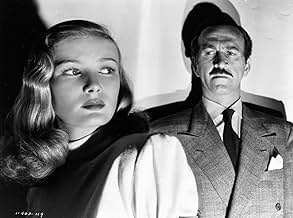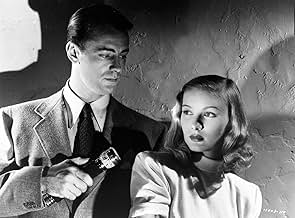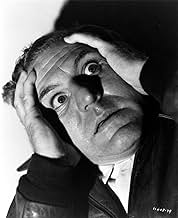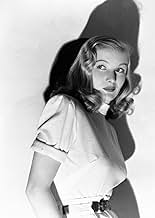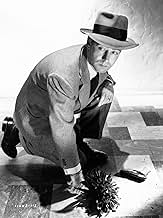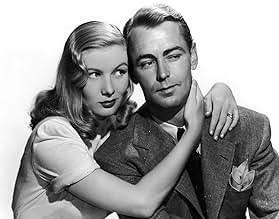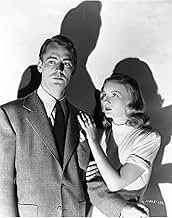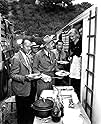- Nominated for 1 Oscar
- 1 win & 1 nomination total
Bea Allen
- News Clerk
- (uncredited)
Harry Barris
- Bellhop
- (uncredited)
George Barton
- Cab Driver
- (uncredited)
Mary Bayless
- Bar Patron
- (uncredited)
Edward Biby
- Restaurant Patron
- (uncredited)
Nina Borget
- Mexican Waitress
- (uncredited)
- Director
- Writer
- All cast & crew
- Production, box office & more at IMDbPro
Featured reviews
Although riddled with improbabilities, Raymond Chandler's tough story and script is well served with a glossy look and the hard-edged performances drawn by director George Marshall from a superior cast. THE BLUE DAHLIA concerns a recently discharged military man Johnny Morrison (Alan Ladd) who returns home to find his wife Helen (Doris Dowling) has been as unfaithful as the day is long--and is presently carrying on with club owner Eddie Harwood (Howard da Silva), over whom her hold is not entirely romantic. After stomping out into the rain, Morrison learns Helen has been murdered, and must race to prove his innocence before the coppers pick him up.
Ladd would give considerably more sophisticated performances in his later years, but he strikes all the right ultra-tough chords, and although Veronica Lake is a rather wooden actress she is remarkably beautiful and as a team the pair has considerable chemistry. The standouts in the cast, however, are Da Silva, who gives the role of the heavy a surprising interpretation, and William Bendix, who plays Ladd's war-wounded buddy to great effect.
THE BLUE DAHLIA lacks both the moodiness and grittiness of truly great film noir, so it is not in the first rank of the genre--but it is no less enjoyable for that. The film cracks along at a rapid pace with plenty of action and a surprise twist or two that will keep you guessing to the very end. Ladd and Lake fans will love it, and any one who likes the hardboiled style will be in for a real treat. Recommended.
Gary F. Taylor, aka GFT, Amazon Reviewer
Ladd would give considerably more sophisticated performances in his later years, but he strikes all the right ultra-tough chords, and although Veronica Lake is a rather wooden actress she is remarkably beautiful and as a team the pair has considerable chemistry. The standouts in the cast, however, are Da Silva, who gives the role of the heavy a surprising interpretation, and William Bendix, who plays Ladd's war-wounded buddy to great effect.
THE BLUE DAHLIA lacks both the moodiness and grittiness of truly great film noir, so it is not in the first rank of the genre--but it is no less enjoyable for that. The film cracks along at a rapid pace with plenty of action and a surprise twist or two that will keep you guessing to the very end. Ladd and Lake fans will love it, and any one who likes the hardboiled style will be in for a real treat. Recommended.
Gary F. Taylor, aka GFT, Amazon Reviewer
The Blue Dahlia is directed by George Marshall and written by Raymond Chandler. It stars Alan Ladd, Veronica Lake, William Bendix & Howard Da Silva. Plot sees Ladd playing a navy officer who returns home to his unfaithful wife after fighting in the South Pacific. When she is found murdered he is the number one suspect, he must find who is responsible before it's too late.
Legend has it that Paramount Pictures were so pleased about the success of Double Indemnity, and in particular Raymond Chandler's writing on it, they handed the writer a contract, where, he produced this tightly wound film noir piece. Nominated for an Academy Award, Chandler had in fact had to give up his teetotaller way of life (he was a recovering alcoholic) so as to gain inspiration for the story. Also of note is that his original ending was shelved after objections by the U.S. Military Department, shame, because I believe that an already good film could have been a better one with Chandler's original denouement. Oh well, what's left is still rather rewarding to the genre faithful.
After This Gun for Hire and The Glass Key, this was the third pairing of Alan Ladd & Veronica Lake. Their working chemistry set in stone, it's nice that the film doesn't solely rely on the pair to make Chandler's material work. True enough their scenes have a tenderness to them, acting as a sort of warm place to go to when the harsher aspects in the plot hit home hard, but the film is far more than just the Ladd & Lake show. What marks it out as a worthy point of reference in the film noir cycle, is that it delves into the psyche of the servicemen returning home from the war. Observing how they were being received and showing that some of them also carried emotional scars as well as those ones gained in battle. Then Chandler mixes it in with a hard-boiled murder investigation as our wrongly accused protagonist trawls the mean streets of L.A. searching to clear his name. With that comes grungy premises' and periods of brutal violence, all cloaked moodily by the competent Marshall. Ladd does good work, very appealing yet tough, but it's Bendix who steals the movie with an intense portrayal of an ex serviceman with psychological issues.
With the original ending and a deeper exploration of the war veterans not being warmly received on homecoming, The Blue Dahlia would have been close to being a genre classic. The script and Bendix ensure, tho, that it's still very easy to recommend to like minded fans of the genre and its dark alley offshoots. 7.5/10
Legend has it that Paramount Pictures were so pleased about the success of Double Indemnity, and in particular Raymond Chandler's writing on it, they handed the writer a contract, where, he produced this tightly wound film noir piece. Nominated for an Academy Award, Chandler had in fact had to give up his teetotaller way of life (he was a recovering alcoholic) so as to gain inspiration for the story. Also of note is that his original ending was shelved after objections by the U.S. Military Department, shame, because I believe that an already good film could have been a better one with Chandler's original denouement. Oh well, what's left is still rather rewarding to the genre faithful.
After This Gun for Hire and The Glass Key, this was the third pairing of Alan Ladd & Veronica Lake. Their working chemistry set in stone, it's nice that the film doesn't solely rely on the pair to make Chandler's material work. True enough their scenes have a tenderness to them, acting as a sort of warm place to go to when the harsher aspects in the plot hit home hard, but the film is far more than just the Ladd & Lake show. What marks it out as a worthy point of reference in the film noir cycle, is that it delves into the psyche of the servicemen returning home from the war. Observing how they were being received and showing that some of them also carried emotional scars as well as those ones gained in battle. Then Chandler mixes it in with a hard-boiled murder investigation as our wrongly accused protagonist trawls the mean streets of L.A. searching to clear his name. With that comes grungy premises' and periods of brutal violence, all cloaked moodily by the competent Marshall. Ladd does good work, very appealing yet tough, but it's Bendix who steals the movie with an intense portrayal of an ex serviceman with psychological issues.
With the original ending and a deeper exploration of the war veterans not being warmly received on homecoming, The Blue Dahlia would have been close to being a genre classic. The script and Bendix ensure, tho, that it's still very easy to recommend to like minded fans of the genre and its dark alley offshoots. 7.5/10
"The Blue Dahlia" (1946) is a film noir directed by George Marshall and stars Alan Ladd, Veronica Lake, William Bendix, Howard Da Silva and Will Wright. It was the third pairing of the box-office bombshells Ladd and Lake and it is a marked improvement on their previous two outings, "This Gun for Hire" and "The Glass Key", both from 1942. The key credit to this should probably go to scriptwriter Raymond Chandler, probably the best hardboiled crime novelist there ever was along with Dashiell Hammett.
The story is classic noir: Johnny Morrison (Ladd), war veteran of the South Pacific, returns home to find his wife (Doris Dowling) has been unfaithful. He walks out on her, and shortly after she is found dead. His war buddies Buzz Wanchek (William Bendix) and George Copeland (Hugh Beaumont) believe he is innocent, but everything points towards to Morrison...
The screenplay has some vintage Chandler lines, and characters like Bendix's disturbed veteran and Wright's marvelously smarmy house peeper could have jumped out of his Philip Marlowe novels. However, the ending is weak due to interference from the U.S. military, but the movie as a whole still packs a sizable punch. Director Marshall serves his material admirably and cinematographer Lionel Lindon gives us some very dark and atmospheric shots. Acting wise, Bendix takes the top honours, but Ladd and Lake are both very good, as is Howard Da Silva, owner of the eponymous "Blue Dahlia Club" .
This film noir is one definitely to check out.
The story is classic noir: Johnny Morrison (Ladd), war veteran of the South Pacific, returns home to find his wife (Doris Dowling) has been unfaithful. He walks out on her, and shortly after she is found dead. His war buddies Buzz Wanchek (William Bendix) and George Copeland (Hugh Beaumont) believe he is innocent, but everything points towards to Morrison...
The screenplay has some vintage Chandler lines, and characters like Bendix's disturbed veteran and Wright's marvelously smarmy house peeper could have jumped out of his Philip Marlowe novels. However, the ending is weak due to interference from the U.S. military, but the movie as a whole still packs a sizable punch. Director Marshall serves his material admirably and cinematographer Lionel Lindon gives us some very dark and atmospheric shots. Acting wise, Bendix takes the top honours, but Ladd and Lake are both very good, as is Howard Da Silva, owner of the eponymous "Blue Dahlia Club" .
This film noir is one definitely to check out.
Raymond Chandler wrote this script and it is him through and through, I think. It's a very bleak tale of returning war veterans' findings when they reach "home." Unfaithful wife, hoodlums, and just general corruption and bleakness. The scenes with Veronica Lake are the shafts of light in this one's blackness (what did you expect, she's Veronica Lake, one of the most beautiful screen starlet ever), but all in all it conjours up dark images in one's mind. I once heard someone argue that this wasn't film noir. I disagree as much as I can. There is much inner struggle in the characters, settings of bleakness, amnesia, corruption everywhere, unfaithful spouses, murders, cops, criminals, and finally the dark visual expression (with rain as an added bonus). Do not miss this film.
The trailer for The Blue Dahlia advertised the film as Ladd, Lake, and Bendix. Not a mention about Raymond Chandler, maybe he wanted it that way.
The Blue Dahlia has mystery writer Raymond Chandler writing an original screenplay and Chandler delivers a good movie for the most part. Nice suspenseful noir film, but it could have been better.
The main weakness in the plot is Veronica Lake. Chandler couldn't stand her and called her Moronica Lake as a reflection of her acting ability. In fairness it's a poorly defined role and her meeting with Alan Ladd in this film is too too coincidental. I guess you had to give the star a love interest, but the idea that Ladd is hunting for the killer of his wife and just happens to come upon the wife of his number one suspect is way too unreal.
The number one suspect of the killing is Howard DaSilva. If I had to name the best performance in this film it would have to be DaSilva. He's the dapper, elegant owner of a Hollywood nightclub, but he exudes a menace that chills you. His best scene in the film is paying off blackmailer Will Wright. He pays him, THIS TIME. Wright gets the message he'd better not come back for more.
I believe it was Raymond Chandler who also said that Alan Ladd was a small boy's idea of a tough guy. That is unfair to Ladd who delivers a more than competent performance here as the returning war veteran who's on the hunt for his wife's killer while being suspected of the crime itself.
Check out Alan Ladd's scene at the farm with DaSilva's thugs. Very similar in the way they end up to how Bogart handled the baddies in The Big Sleep.
Bill Bendix gets in the top billing with stars Ladd and Lake because he's also a radio star because of the Life of Riley Show. Bendix and Hugh Beaumont are Ladd's wartime buddies and Bendix never was bad in any film he did. He shows signs of post traumatic stress at a time when that diagnosis had not been invented.
A bit too contrived, but a nice film noir.
The Blue Dahlia has mystery writer Raymond Chandler writing an original screenplay and Chandler delivers a good movie for the most part. Nice suspenseful noir film, but it could have been better.
The main weakness in the plot is Veronica Lake. Chandler couldn't stand her and called her Moronica Lake as a reflection of her acting ability. In fairness it's a poorly defined role and her meeting with Alan Ladd in this film is too too coincidental. I guess you had to give the star a love interest, but the idea that Ladd is hunting for the killer of his wife and just happens to come upon the wife of his number one suspect is way too unreal.
The number one suspect of the killing is Howard DaSilva. If I had to name the best performance in this film it would have to be DaSilva. He's the dapper, elegant owner of a Hollywood nightclub, but he exudes a menace that chills you. His best scene in the film is paying off blackmailer Will Wright. He pays him, THIS TIME. Wright gets the message he'd better not come back for more.
I believe it was Raymond Chandler who also said that Alan Ladd was a small boy's idea of a tough guy. That is unfair to Ladd who delivers a more than competent performance here as the returning war veteran who's on the hunt for his wife's killer while being suspected of the crime itself.
Check out Alan Ladd's scene at the farm with DaSilva's thugs. Very similar in the way they end up to how Bogart handled the baddies in The Big Sleep.
Bill Bendix gets in the top billing with stars Ladd and Lake because he's also a radio star because of the Life of Riley Show. Bendix and Hugh Beaumont are Ladd's wartime buddies and Bendix never was bad in any film he did. He shows signs of post traumatic stress at a time when that diagnosis had not been invented.
A bit too contrived, but a nice film noir.
Did you know
- TriviaThe pressure of having to finish the screenplay combined with the curveball of having to write an entirely new ending was too much for Raymond Chandler. He quickly came down with a severe case of writer's block. According to a near-legendary story, Chandler offered to finish the screenplay by working drunk; in exchange for sacrificing his health to produce the requisite pages on time, Chandler was permitted to work at home (a privilege rarely granted to screenwriters) and was provided two chauffeured cars, one to convey the completed pages to the studio and the other for his wife. Chandler turned the script in on time. Many now believe the drunkenness was simply a ruse by Chandler to wrangle extraordinary privileges from the desperate studio.
- GoofsJoyce tells Johnny that the tide is out. Clearly the tide is all the way in, completely covering the beach.
- Quotes
Joyce Harwood: Well, don't you even say 'Good night'?
Johnny Morrison: It's "good-bye", and it's tough to say good-bye.
Joyce Harwood: Why is it? You've never seen me before tonight.
Johnny Morrison: Every guy's seen you before somewhere. The trick is to find you.
- ConnectionsFeatured in The Hollywood Collection: Alan Ladd: The True Quiet Man (1999)
- How long is The Blue Dahlia?Powered by Alexa
Details
Box office
- Gross US & Canada
- $2,700,000
- Runtime1 hour 36 minutes
- Color
- Aspect ratio
- 1.33 : 1
Contribute to this page
Suggest an edit or add missing content



